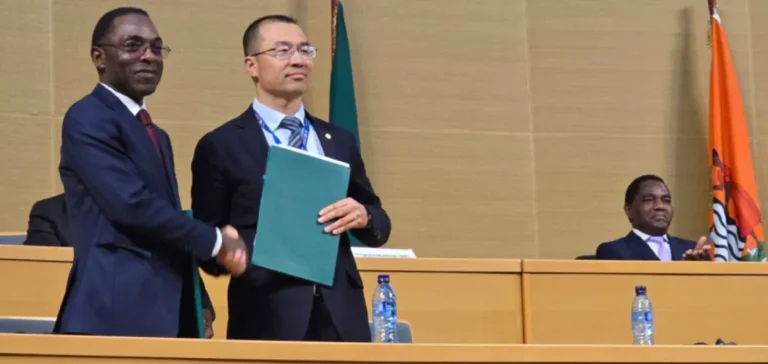Zambia has announced the signing of a financing agreement worth USD 1.1 billion (ZMW27.9bn) with Chinese company Fujian Xiang Xin Corporation for the construction of a petroleum refinery in Ndola. The strategic project, with a processing capacity of 60,000 barrels of oil per day, aims to reduce the country’s reliance on imported petroleum products and foster the development of its energy and industrial sectors.
Project Components and Supply Logistics
The facility will include several units, including liquefied petroleum gas (LPG) conditioning units, a 130-megawatt power plant, a lubricating oil blender, and bitumen production facilities. Crude oil will be imported from the Middle East via the port of Dar es Salaam in Tanzania, then transported to Ndola for refining. The complex aims to support domestic consumption while exploring export opportunities to neighbouring markets.
The project has been presented as a lever for the country’s industrial and energy growth, as Zambia seeks to reduce its refined fuel imports. In 2023, Zambia imported USD 1.79 billion (ZMW45.3bn) worth of refined petroleum products, representing a significant portion of its foreign exchange expenditures.
Technical and Financial Challenges in Implementation
Despite the ambitious scope of the project, several uncertainties remain regarding its implementation. The construction timeline, which foresees the start of work in the third quarter of 2025 with commissioning in 2026, appears particularly ambitious. Details regarding the engineering phase and the financial structuring of the project remain unclear, raising questions about its feasibility within the proposed timeframe.
The project’s financing, which includes significant foreign participation, is crucial for ensuring its viability. The lack of precise information on cost allocation and financing arrangements makes it difficult to anticipate the evolution of the project.
Potential Impact on the Country’s Trade Balance
The construction of the refinery is part of a broader effort to limit the import of refined products, which represent a significant portion of the country’s foreign currency outflows. The project could transform Zambia’s energy dynamics and allow it to reduce its reliance on imported petroleum products while supporting industrial development. In the long term, local production could also provide export opportunities, thereby strengthening the country’s economic position in the region.
Zambia hopes that this refinery will serve as a catalyst for diversifying its economy while improving its energy self-sufficiency and reducing its foreign currency requirements for fuel imports.






















